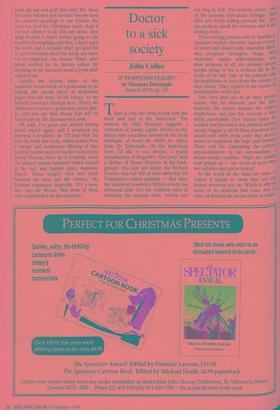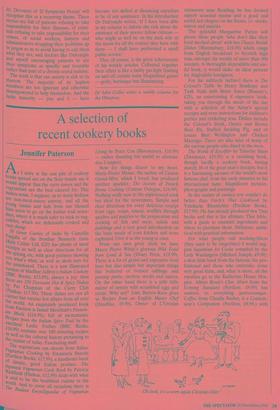Doctor to a sick society
John Collee
IF SYMPTOMS PERSIST by Theodore Dalrymple Deutsch, £8.99, pp. 150 There is only one thing wrong with this book and that is the dust-cover. The cartoon by Nick Newman suggests a collection of jaunty, japish, Doctor-in-the- House type anecdotes instead of the bleak catalogue of social ills which we expect from Dr Dalrymple. On the paperback cover I'd like to see, instead, a murky reproduction of Hogarth's 'Gin Lane' with a skyline of Tower Hamlets in the back- ground. This may not attract the Richard Gordon fans but will at least underline Dr Dalrymple's central message — that since the industrial revolution British society has advanced little. For the common mass of humanity life remains nasty, brutish and too long by half. 'I've realised, doctor', nne of his patients announces tellingly, 'that life's not worth killing yourself for.' And she seems to speak for everyone else in the waiting room. These waiting patients will be familiar to Spectator readers: the sorry legions of be* en wives and abused kids, miserable ates, pregnant teenagers, thugs, child molesters, rapists, schizophrenics, and' most poignant of all, the ordinary decent people trying to live a civilised life in the midst of all this. One of his patients ask", his neighbours to turn down the volume 01 their music. 'They replied to his request hY breaking four of his ribs.' Yes, here they are in all their grotes. querie, the fat slatterns and the bastards, the school truants, the violent stepfathers, and just for contrast a 1011,e sickly paedophile ('for several years hl" sciatica had precluded any physical actisntY except buggery'), all of them described in a poised and witty prose style that metelY serves to emphasise the huge gulf betweee Them and Us. Lamenting the cultural impoverishment in his surroundings, 3 prison warder confides: 'That's the trouble with prison, sir — use words of more than two syllables and you're flicked.' In the world of the inner-city slum 14 course it begins to seem that you are fucked whatever you do. Which is why s° many of its denizens find some way 01 other of denying the proper rules of causal' ity. Devotees of 'If Symptoms Persist' will recognise this as a recurring theme. These stories are full of patients refusing to take responsibility for their illnesses, of crimi- nals refusing to take responsibility for their crimes, of social workers, lawyers and administrators wrapping their problems up in jargon so as to avoid having to call them what they are, and doctors like Dalrymple and myself encouraging patients to see their symptoms as specific and treatable rather than part of a chronic social malaise. The truth is that our society is sick to its marrow. The majority of its hapless members are too ignorant and otherwise disempowered to help themselves. And the lucky minority — you and I — have become too skilled at distancing ourselves to be of any assistance. In his introduction Dr Dalrymple writes, 'If I have been able in my column to inform the rich about the existence of their poorer fellow citizens — who might as well be on the dark side of the moon for all the contact they have with them — I shall have performed a small public service.' That, of course, is the great achievement of his weekly articles. Collected together their effect is like a faulty gas-light flashing on and off outside some Hogarthian garret — grisly, burlesque but illuminating.
Dr John Collee writes a weekly column for the Observer.



































































 Previous page
Previous page